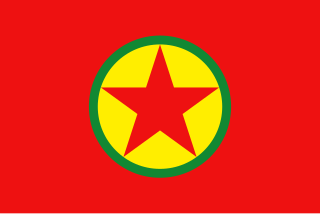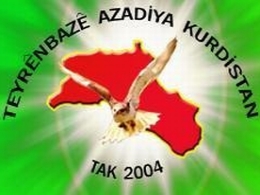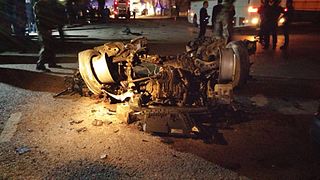
The Kurdistan Workers' Party or PKK is a Kurdish militant political organization and armed guerrilla movement which historically operated throughout Kurdistan but is now primarily based in the mountainous Kurdish-majority regions of southeastern Turkey and northern Iraq. Since 1984, the PKK has been involved in asymmetric warfare in the Kurdish–Turkish conflict. Although the PKK initially sought an independent Kurdish state, in the 1990s its official platform changed to seeking autonomy and increased political and cultural rights for Kurds within Turkey.

Abdullah Öcalan, also known as Apo, is a political prisoner and founding member of the militant Kurdistan Workers' Party (PKK).
The history of the Kurdistan Workers' Party (PKK) began in 1974 as a Marxist–Leninist organization under the leadership of Abdullah Öcalan. In 1978 the organization adopted the name "Kurdistan Workers Party" and waged its low-level Urban War in Turkish Kurdistan between 1978 and 1980. The PKK restructured itself and moved the organization structure to Syria between 1980 and 1984, after the 1980 Turkish coup d'état. The Kurdish-Turkish conflict began in earnest in 1984. The rural-based insurgency lasted between 1984 and 1992. The PKK shifted its activities to include urban attacks against Turkish military bases between 1993–1995 and later 1996–1999. Öcalan was captured in Kenya in early 1999. After a "self declared peace initiative of 1999", hostilities resumed in February 2004. 2013 saw another ceasefire, but the conflict resumed again in 2015 and has continued since.

Turkish Aerospace Industries Inc. is a state-owned arms company in Turkey.

The Kurdistan Freedom Hawks, or TAK, is a Kurdish nationalist militant group in Turkey seeking an independent Kurdish state in Turkish Kurdistan. The group also opposes the Turkish government's policies towards Kurds in Turkey. It has been designated as a terrorist organization by the US, UK and Australian governments.

This is the timeline of the Turkish-Kurdish conflict. The Kurdish insurgency is an armed conflict between the Republic of Turkey and various Kurdish insurgent groups, which have demanded separation from Turkey to create an independent Kurdistan, or to have autonomy and greater political and cultural rights for Kurds in Turkey. The main rebel group is the Kurdistan Workers' Party or PKK, which was founded on November 27, 1978, and started a full-scale insurgency on August 15, 1984, when it declared a Kurdish uprising. Apart from some extended ceasefires, the conflict has continued to the present day.
The word serhildan describes several Kurdish protests and uprisings since the 1990s that used the slogan "Êdî Bese" ("Enough") against Türkiye. Local shops are often closed on the day of demonstrations as a form of protest.
The 2011–2012 Kurdish protests in Turkey were protests in Turkey, led by the Peace and Democracy Party (BDP), against restrictions of Kurdish rights by of the country's Kurdish minority's rights. Although they were the latest in a long series of protest actions by Kurds in Turkey, they were strongly influenced by the concurrent popular protests throughout the Middle East and North Africa, and the Turkish publication Hürriyet Daily News has suggested that the popularly dubbed "Arab Spring" that has seen revolutions in Egypt and Tunisia may lead to a "Kurdish Summer" in the northern reaches of the Middle East. Protesters have taken to the streets both in Istanbul and in southeast Turkey, with some demonstrations also reported as far west in Anatolia as İzmir.

Salih Muslim Muhammad is the co-chairman of the Democratic Union Party (PYD), the main party of the Autonomous Administration of North and East Syria. As the deputy coordinator of the National Coordination Committee for Democratic Change, he has been the most prominent Kurdish representative for much of the Syrian civil war.

The Solution process, also known as Peace process or the PKK–Turkish peace process, was a peace process that aimed to resolve the conflict between the Turkey and PKK as part of the Kurdish–Turkish conflict (1978–present). The conflict has been ongoing since 1984 and resulted in some 40,000 mortal casualties and great economic losses for Turkey as well as high damage to the general population.

The Suruç bombing was a suicide attack by the Turkish sect of Islamic State named Dokumacılar against Turkish leftists that took place in the Suruç district of Şanlıurfa Province in Turkey on 20 July 2015, outside the Amara Culture Centre. A total of 34 people were killed and 104 were reported injured. Most victims were members of the Socialist Party of the Oppressed (ESP) Youth Wing and the Socialist Youth Associations Federation (SGDF), university students who were giving a press statement on their planned trip to reconstruct the Syrian border town of Kobanî.
In late July 2015, the third phase of the Kurdish–Turkish conflict between various Kurdish insurgent groups and the Turkish government erupted, following a failed two and a half year-long peace process aimed at resolving the long-running conflict.

The Rojava conflict, also known as the Rojava Revolution, is a political upheaval and military conflict taking place in northern Syria, known among Kurds as Western Kurdistan or Rojava.

The February 2016 Ankara bombing killed at least 30 people and injured 60 in the capital of Turkey. According to Turkish authorities, the attack targeted a convoy of vehicles carrying both civilian and military personnel working at the military headquarters during the evening rush hour as the vehicles were stopped at traffic lights at an intersection with İsmet İnönü Boulevard close to Kızılay neighborhood. Several ministries, the headquarters of the army and the Turkish Parliament are located in the neighbourhood where the attack occurred. The Kurdistan Freedom Hawks (TAK) took responsibility for the attack and said they targeted security forces. Censorship monitoring organization Turkey Blocks reported nationwide internet restrictions beginning approximately one hour after the blast pursuant to an administrative order. The attack killed 14 military personnel, 14 civilian employees of the military, and a civilian.
In the early morning of 25 April 2017, the Turkish Air Force conducted multiple airstrikes against media centers and headquarters of the People's Protection Units (YPG) and the Women's Protection Units (YPJ) in northeastern Syria, and against positions of the Sinjar Resistance Units (YBŞ) on Mount Sinjar, northwestern Iraq. The airstrikes killed 20 YPG and YPJ fighters in Syria in addition to five Peshmerga soldiers in Iraq.
Terrorism in Turkey is defined in Turkey's criminal law as crimes against the constitutional order and internal and external security of the state by the use of violence as incitement or systematic to create a general climate of fear and intimidation of the population and thereby effect political, religious, or ideological goals. Since the establishment of the Republic of Turkey, both organized groups, lone wolf, and international spy agencies have committed many acts of domestic terrorism against Turkish people.

A terrorist attack occurred on İstiklal Avenue in the Beyoğlu district of Istanbul, Turkey, on 13 November 2022, killing 6 people and injuring 81 others.

The Kurdistan Workers' Party insurgency is an armed conflict between the Republic of Turkey and the Kurdistan Workers' Party, as well as its allied insurgent groups, both Kurdish and non-Kurdish, who have either demanded separation from Turkey to create an independent Kurdistan, or attempted to secure autonomy, and/or greater political and cultural rights for Kurds inside the Republic of Turkey.
On 1 October 2023, a suicide bombing occurred in front of the General Directorate of Security building in the Turkish capital Ankara, injuring two police officers. The bomber's companion, who was also planning to blow himself up, was shot and killed by police before he could detonate his explosive. Prior to the attack, the perpetrators reportedly hijacked a vehicle in Kayseri and killed its driver before driving to Ankara. The PKK claimed responsibility for the attack.
Individuals and events related to 2024 in Turkey.















